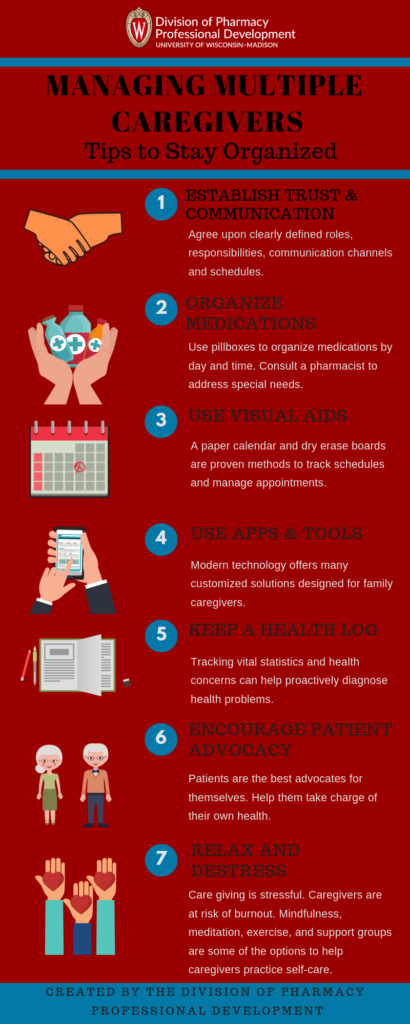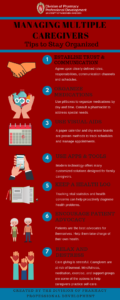Managing Multiple Caregivers: 7 Tips to Stay Organized
My colleague hung up the phone with a sigh of relief. He had been navigating family drama for several hours now. The problem wasn’t resolved, but he was glad to be done with the conversation. There had been a miscommunication between two family members who were taking care of his dad. This resulted in his dad receiving the incorrect dosage of his medication for a few weeks.
His father had ended up in the hospital for a completely unrelated problem. It was during this hospital visit that the error was discovered. Both parties were exceptionally distraught and upset over the miscommunication and error. Neither wanted to admit responsibility and wanted the other to shoulder the blame. In addition to the tension between two family member/caregivers, the family had to figure out a way to prevent future errors.
Fortunately, the incorrect dose in this scenario was harmless. However, an incorrect dosage of medication can often have life-threatening and sometimes fatal consequences.
It is common to have patients with multiple caregivers. Family members may share responsibilities to care for a sick relative. Many families may hire caregivers for additional assistance. Family caregivers typically do not have any formal training. Missed dosages, double dosages, and missed appointments can be all too common with multiple caregivers. Pharmacists and healthcare professionals have an opportunity to guide and organize multiple caregivers.
Here are seven tips that can help patients and their multiple caregivers stay organized. 

Establish Trust and Communication
It is critical for multiple caregivers to establish trust and communication. Determine the roles and responsibilities for everyone on the care team. Set a clear schedule of tasks and duties. Make sure there are backups in case of emergencies. Decide on who and how to communicate and how often. Have an action plan in place to resolve conflicts and miscommunications. Apps like GroupMe, Telegram, Whatsapp and Facebook Messenger let you form chat groups to communicate in real time. Some of these apps are available on desktop as well for caregivers who may not have a smartphone. Schedule regular caregiver team check-in phone calls as well.
Organize Medications
The most effective step in preventing incorrect dosages is organizing medications. Use pill boxes (dosettes) to organize medicine by day and time. If the patient is unable to do this by themselves delegate responsibility for a caregiver to do this on a regular basis. Pharmacists can help with special needs like easy to open boxes, containers with timers, as well as containers that count openings to see if a daily dose is already given. Some pharmacists will also preload pill containers to provide a few weeks’ supplies.
Use visual aids
Visual aids are useful for maintaining schedules and checklists. They also make switching shifts between caregivers seamless. Use a common paper calendar to keep track of appointments and checkups. Research has shown that paper calendars are the most effective tool for family caregivers. Complement the paper calendar with a large dry erase board or magnetic board with the patient’s medication and healthcare schedule. Highlight important dates like appointments and checkups. Clearly list dosage information. Use checkmarks or magnetic pins to check off a task when it is completed. Hospitals are using this simple but effective communication method as well.
Use Apps & Tools if Needed
Modern technology offers many tools to help caregivers. Multiple caregivers can organize information using file-sharing services like Google Documents, Dropbox, or Box. There are also apps designed to connect a caregiver community. Some of these are CareZone, CaringBridge, and LostaHelpingHands.
Keep a health log
Logging patient health and vital statistics in a journal can help caregivers quickly identify any anomalies. Keep a dated journal of health information such as temperature, blood pressure, and blood glucose if the patient is diabetic. For patients with mental health conditions or dementia, you may also want to log mood, disposition, memory, clarity and other such factors. Keep track of issues such as pain, discomfort, difficulty swallowing, constipation/diarrhea and consult a doctor if problems persist.
Encourage patient advocacy
The patient is always the best advocate for themselves and their health. Give patients the tools and support to take charge of their own health when possible. Help them understand what medications they take, why, and what the correct dosage is. Encourage them to ask questions and give thorough feedback to doctors, pharmacists, and caregivers. Listen to their concerns with empathy and address them immediately.
Relax and DE-stress
Caregiving can be hectic and stressful. Many family caregivers have family and job obligations of their own which add to the overall stress level. Short term assistance can quickly become a long-term obligation with no end in sight. As time passes, burnout is a strong possibility. Multiple caregivers can spell each other and offer support. Rotate the schedules so everyone has time off and vacation from their caretaking responsibilities.Respite care is an option for breaks or rotating schedules. They offer home and short stay accommodation in a healthcare facility or adult day center. Insurance does not cover respite care, but Medicare covers up to 5 days.
Some people find help practicing mindfulness and meditation helpful. Speak up if you are having difficulty keeping up. It may help to join a local support group for caregivers. As a family caregiver, you provide essential services for a loved one. Sharing responsibilities with others is vital to make the burden manageable, but communication will be key. With a little planning and organization, you and your other caregivers can help provide a caring and nurturing environment for your loved one while maintaining a busy lifestyle.
Our Commitment to Patient Care
The Division of Pharmacy Professional Development is committed to helping pharmacists and healthcare professionals deliver optimal patient outcomes. We have partnered with United Way of Dane County and Pharmacy Society of Wisconsin to offer two free fully-accredited online courses (Deprescribing in the older adult & Healthy Aging Initiative) to improve patient care for the elderly. You can find a complete listing of our accredited healthcare courses and conferences here.
